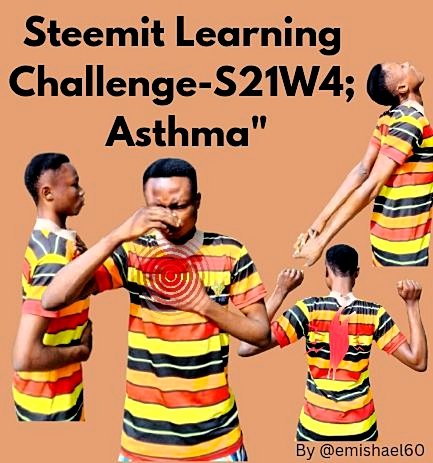Steemit Learning Challenge-S21W4; Asthma"
2 comments
 My picture, designed in Canva.
My picture, designed in Canva.
Just try to imagine the terrors of waking up in the middle of the night, gasping for air, and feeling that some kind of invisible force has clasped neck and chest together. That's real, and that is a common thing for millions of people living with asthma all over the world. But what if I told you there was more to this condition than just inhalers and wheezing? Let's go ahead and dig up some of those little-known facts about asthma-from shocking causes and symptoms right through to some very interesting treatments. However,if you are an asthma patient or simply interested in finding out about asthma, this is one post you don't want to miss. Ready to breathe easier? Let's begin the dive into this informative post.
What is asthma? You are to write in your words after reading the knowledge from the lesson post. |
|---|
Firstly, the sickness called asthma is among chronic diseases or conditions of the lungs that affect our airways in the lungs. And there are seven main types of asthma due to my research the types are;Allergic Asthma,Non-Allergic Asthma,Exercise-Induced Asthma,Occupational Asthma,Childhood Asthma,Adult-Onset Asthma,
And Aspirin-Induced Asthma. So ,however Asthma can affect anybody from a child, teenager, and an adult. Perhaps you might be thinking of what an airway is, right!!! Airways is the tubes that carries air in our lungs weather breathing in or out. However,Asthma can normally causes inflammation in the lungs and heart, it often makes a constriction of the airways, therefore making it difficult to breathe. It may cause coughing, wheezing, shortness of breath, chest tightness among many other symptoms.
Asthma-If we understand the symptoms, we can surely begin the fight to battle it. These are some of the early symptoms.
Cough
Wheezing
Waking up at night
Difficulty in breathing:Let just take our air passage as a road where people and cars are passing through. In case of a traffic jam-(swelling,) it means the cars-(air)can't go smoothly and will find it very difficult forcing their way through. That is what happens in asthma: the airways swell up, becoming narrow so that air hardly passes through them.
- Producing mucus: Just imagine trying to drink thickened milk through a very small-strained straw. You can see how the milk will not easily and quickly move through it. It is just so here with asthma-the extra mucus lining the airway hampers the passage of air, just as how thick milk makes it hard to drink through a straw.
Causes
These include:
- Dust
- Smoke
- Cold air
- Hard exercise
- Obesity
- Family history
- Respiratory infection
- Smoking
In general these few causes really triggers asthma. If Should the person with asthma come into contact with all these trigger, his airways may swell up further and narrow.
In many parts of Africa, people cook either with open fires or with charcoal stoves. Smoke from these may also serve as a trigger for asthma. For instance, the village child may start coughing and wheezing instantly when he is exposed to the cooking fire; this is as a results from irritation by smoke of the airways hence triggering an asthma attack. Another probable scenario could most probably be during the Harmattan season, during which, in the region of West Africa, the winds across the region are dry with a lot of dust. In many people, the dust in the air brings on asthma symptoms.
How will you diagnose a asthma? Any clinical investigation or assessment tests? |
|---|
The diagnosis of Asthma involves numerous ways. Usually, I have to use a combination of medical history, physical exams, and tests to find out whether a person has asthma.
My Steps in the Diagnosis

History:- I will check for the person history of cough, wheeze, or shortness of breath and how it usually worsens during the night time or on exertion. Normally I will ask about family history of the patient to know if any of his or her family members as asthma for the past years,or presently.
Physical Examination: I would go through the lungs with a stethoscope to determine the presence of wheezing. I will be also examining the nose, throat, and upper airway.
Tests of lung function describe the quality of one's functions of the lungs. One common test I would use includes spirometry, whereby the patient will blow into a device that will measure how much air he/she can excrete and how quick. This is important in helping me see whether the airways are narrowed.
Clinical Investigation or Assessment Tests
- Spirometry: The name of this test might sound somehow, but note that this test is done to measure the amount of air that someone is able to breathe out and at what speed the action can be effected. So Helping one find out whether the airways are narrowed, the patient as to take a deep breath and then blow out as hard and fast as he can into a tube that is connected to the spirometer.
Peak Flow Meter: This is another method of the test. This device I just mentioned is so small.It is used to blows air into to measure how well his or her lungs are working. Lower readings from the device can or may mean that one's asthma is getting worse. The peak flow meter can be use at home for monitoring asthma.
Methacholine challenge: this is a chemical capable of shrinking airways. You are most likely to have asthma in cases where you react to it. You take this test by receiving increasing doses of methacholine, and immediately thereafter you are performing spirometry, which will measure your airways' reaction.
Testing for Allergens: Since allergens too are a culprit in causing asthma, I'd want to get myself tested for common allergens such as pollen, dust mites, or pet dander. It is done through skin or blood tests.
Practice at least 3 exercises that you learned from the lesson. You may share images, gifs, or videos while practicing. |
|---|
The Following are three exercises which will help control asthma:
- Box breathing

It is simple and perhaps will help quiet down the mind and body. The technique can come in quite handy in cases of asthma attacks or when one feels short of breath.
Steps:
Sit comfortably and close your eyes.
Breathe in slowly through your nose for up to 4 times.
Hold for 4 counts.
Breathe out slowly through your mouth for 4 counts.
Hold for another 4 counts.
Do so for a few minutes.
This will relax your breathing process and help it will surely helps to reduce problems associated with asthma.
- Diaphragmatic Breathing Exercise:This is the second excersice I practiced,so what I found out is that this exercise will strengthen the major muscle separating our chest cavity from abdominal cavity called diaphragm which surely Generate proper breathing. It assists in respiration.

Steps:
First of all you have to sit or stand straight.
After doing that, place any of your hand on your chest and then use the other hand to place on your stomach.
Start to breathe in slowly in the nose, and when breathing allow the stomach to rise up.Then , Breathe out slowly from the mouth, and then allow the stomach to fall slowly.
You Can Repeat this for 5-10 minutes.
This excersice allows deeper breathing, and may allow improvements in the functioning of the lungs.
- Chest Stretches
Stretching one's chest could help open it up and thus improve breathing. These can be very helpful when there is a feeling of constriction of the chest.

Steps:
Stand or sit up straight.
Clasps your hands behind your back.
Pull your shoulders back by pulling your hands apart slightly.
Hold stretch for 15-30 seconds.
Repeat a few times.
These exercises are important in expanding your chest and giving you an easy time breathing, especially after having sat for a long time.
Please share your review after performing these exercises either on yourself, healthy individual or patient. |
|---|
After doing these exercises, I found a number of benefits that could be helpful for people suffering from asthma:
- Box Breathing:
This exercise left me so relaxed and unanxious. It will also assist at times of short breathing, because it keeps the mind calm by breathing and counting.
- Diaphragmatic Breathing:
It seemed to make my breathing deeper and more controlled, as if I take in more air into my lungs. To the asthmatic patient, this may help improve the general breathing of a person and reduce breathlessness while doing simple activities.
- Chest Stretches:
These stretches opened my chest and made breathing even easier, especially after a little time sitting. Doing the stretches regularly reduces chest tightness and is good for your posture, which is very useful for asthmatic people.
Generally speaking, all these exercises are very easy to perform, and one can perform them anywhere. They really help with managing the symptoms of asthma and thus are effective in the betterment of lung function. I will definitely be recommending the same to anyone looking for ways to support respiratory health.
In conclusion
Asthma is a chronic disease and it is caused by dust, smoking, obesity , cold air,hard excersice etc. And the symptoms are cough, wheezing, difficulty in Breathing and producing mucus. But doing some excersice like Box breathing, Diaphragmatic excersice and chest Stretches excersice we can fight asthma. * Note if you see any of the symptoms, seeing doctor is the best option.
@waterjoe
@josepha
@lunasilver
to participate.

I got a little research knowledge from this bookAsthma do well to click and get your copy.
Cc:
@ashkhan
Comments